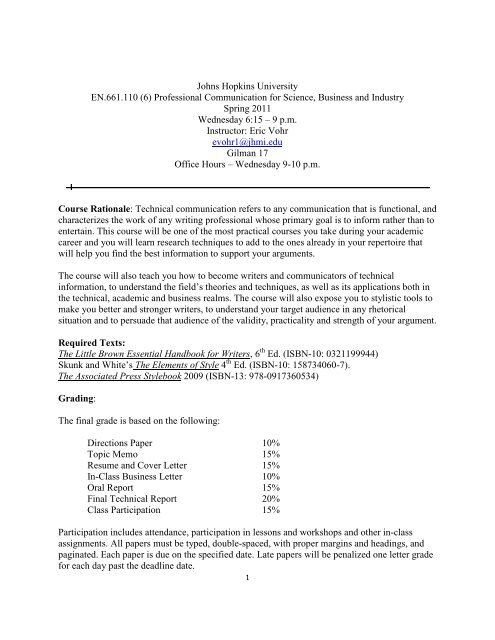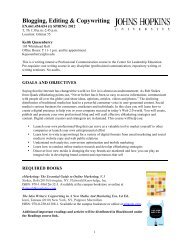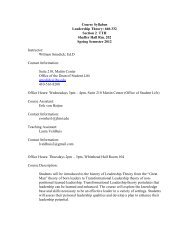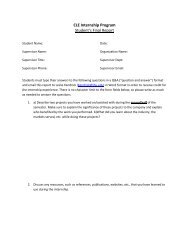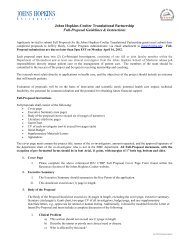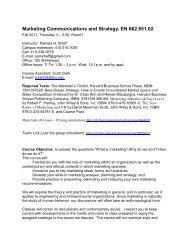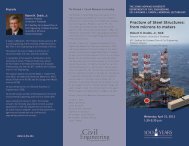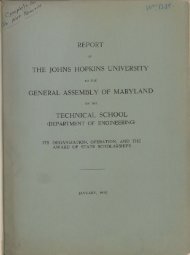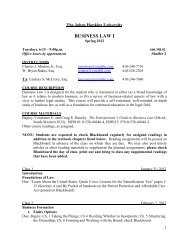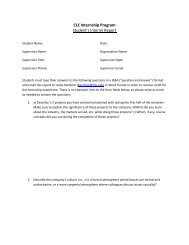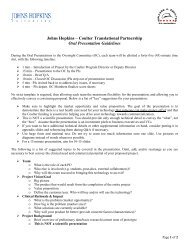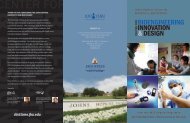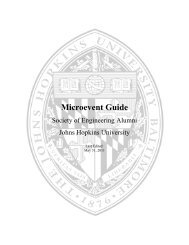661.110.06 - Johns Hopkins University
661.110.06 - Johns Hopkins University
661.110.06 - Johns Hopkins University
Create successful ePaper yourself
Turn your PDF publications into a flip-book with our unique Google optimized e-Paper software.
<strong>Johns</strong> <strong>Hopkins</strong> <strong>University</strong><br />
EN.661.110 (6) Professional Communication for Science, Business and Industry<br />
Spring 2011<br />
Wednesday 6:15 – 9 p.m.<br />
Instructor: Eric Vohr<br />
evohr1@jhmi.edu<br />
Gilman 17<br />
Office Hours – Wednesday 9-10 p.m.<br />
Course Rationale: Technical communication refers to any communication that is functional, and<br />
characterizes the work of any writing professional whose primary goal is to inform rather than to<br />
entertain. This course will be one of the most practical courses you take during your academic<br />
career and you will learn research techniques to add to the ones already in your repertoire that<br />
will help you find the best information to support your arguments.<br />
The course will also teach you how to become writers and communicators of technical<br />
information, to understand the field’s theories and techniques, as well as its applications both in<br />
the technical, academic and business realms. The course will also expose you to stylistic tools to<br />
make you better and stronger writers, to understand your target audience in any rhetorical<br />
situation and to persuade that audience of the validity, practicality and strength of your argument.<br />
Required Texts:<br />
The Little Brown Essential Handbook for Writers, 6 th Ed. (ISBN-10: 0321199944)<br />
Skunk and White’s The Elements of Style 4 th Ed. (ISBN-10: 158734060-7).<br />
The Associated Press Stylebook 2009 (ISBN-13: 978-0917360534)<br />
Grading:<br />
The final grade is based on the following:<br />
Directions Paper 10%<br />
Topic Memo 15%<br />
Resume and Cover Letter 15%<br />
In-Class Business Letter 10%<br />
Oral Report 15%<br />
Final Technical Report 20%<br />
Class Participation 15%<br />
Participation includes attendance, participation in lessons and workshops and other in-class<br />
assignments. All papers must be typed, double-spaced, with proper margins and headings, and<br />
paginated. Each paper is due on the specified date. Late papers will be penalized one letter grade<br />
for each day past the deadline date.<br />
1
Attendance: I take attendance. It is essential to stay caught up in class. This is not a lecturebased<br />
course. Because the course is based largely on classroom interaction, I have a stringent<br />
attendance policy. Because it is a three-semester-hour course, students are allowed one excused<br />
absence. Absences because of serious illness or university-sponsored event, although allowable,<br />
must be documented, otherwise they will be considered unexcused. This does not count for paper<br />
due dates. If a paper is brought to me late, it will be graded down one letter grade for every class<br />
it is late. If I find a paper in my mailbox after the day it is due, I will mark it one class late<br />
because I won’t know what time it got there. If you cannot attend class, bring your paper to my<br />
office and/or get it to me before it is due. All documentation regarding missed classes needs to be<br />
presented as soon as possible to the date missed. I will not accept documentation for a missed<br />
class weeks after the fact. Students are allowed one absence. After that an absence will reduce<br />
your grade by one letter. Work missed because of any absence should be made up, and this is<br />
your responsibility.<br />
Tardiness is equally frowned upon. You are tardy if you are 15 minutes late for class. Every<br />
three will count as a full absence. The best way to avoid these types of deductions is to come to<br />
class prepared and on time.<br />
Papers: All assignments need to be perfect in terms of mechanics: spelling, punctuation and<br />
usage. Mistakes will be graded down. The idea is to approximate professional standards as<br />
closely as possible. We will discuss these when applicable.<br />
Electronic Papers: I want both electronic and hard copies of all assignments.<br />
<strong>University</strong> Ethics Guidelines: The strength of the university depends on academic and personal<br />
integrity. In this course, you must be honest and truthful. Ethical violations include cheating on<br />
exams, plagiarism, reuse of assignments, improper use of the Internet and electronic devices,<br />
unauthorized collaboration, alteration of graded assignments, forgery, falsification, lying,<br />
facilitating academic dishonesty, and unfair competition.<br />
In addition, the specific ethics guidelines for this course are:<br />
Plagiarism and Academic Integrity: Intentionally presenting someone else’s words or work as<br />
your own constitutes plagiarism. Such action will result in an automatic “F” for the class as well<br />
as possible dismissal from the university. The strength of the university depends on academic<br />
and personal integrity. In this course, you must be honest and truthful. Ethical violations include<br />
cheating on exams, plagiarism, reuse of assignments, improper use of the Internet and electronic<br />
devices, unauthorized collaboration, alteration of graded assignments, forgery, falsification,<br />
lying, facilitating academic dishonesty, and unfair competition.<br />
In addition, the specific ethics guidelines for this course are:<br />
(1) Six assignments. Four are individual; Two are collaborative; that is they will be written with<br />
other students in a research team. The distinction between original work and thought and<br />
borrowed work and thought must be maintained by the members of the writing team, as well as<br />
by the individual student who engages in writing and who shares their work with others.<br />
2
Borrowing itself is not problematic, but it is the duty of the writer or team of writers to inform<br />
the reader how ideas and borrowed work comes to the document that is being read.<br />
(2) For example, material from a Web site that does not list an author, that is difficult to<br />
determine in terms of its reliability or the source of its information, is very different from a news<br />
article in the Washington Post, which is different from a syndicated opinion piece, which is<br />
different from a scholarly research article appearing in a recognized professional journal. Using<br />
any of these sources tells your reader much about how to understand the idea and the authority it<br />
carries, and thus much about the writer of the report.<br />
Report any violations you witness to the instructor. You may consult the associate dean of<br />
student affairs and/or the chairman of the Ethics Board beforehand. See the guide on “Academic<br />
Ethics for Undergraduates” and the Ethics Board Web site (http://ethics.jhu.edu) for more<br />
information.<br />
Learning Objectives:<br />
By the end of Technical Communications the student should have a level of competency to:<br />
• Understand and develop argumentative points for a technical document specific to a<br />
given audience;<br />
• Understand the qualities of excellent written argument;<br />
• Recognize the difference between various types of technical reports;<br />
• Be able to write clear and effective instructions;<br />
• Develop the ability to work individually or collaboratively on a project;<br />
• Be able to create effective job application materials;<br />
• Understand the elements of a technical proposal including document design and graphics;<br />
• Understand the elements of an effective oral presentation.<br />
* * *<br />
February<br />
Wednesday 2/1<br />
Lecture: Introduction to the Course What is Technical Writing?<br />
Lecture: The Writing Process<br />
Lecture: Introduction to Assignment #1, Directions Paper<br />
Homework: A and P<br />
Homework: Outline Directions Paper<br />
3
Wednesday 2/8<br />
Due: Paper #1, Directions Paper<br />
Workshop: Discuss A and P<br />
Lecture: Divide Your Time<br />
Lecture: Introduction of Assignment # 2, Topic Memo<br />
Homework: Topic Memo Draft<br />
Homework: Read Lady With a Pet Dog<br />
Wednesday 2/15<br />
Lecture: Writing Styles – What is your style?<br />
Workshop: Topic memo<br />
Homework: Index Cards – Topic memo<br />
Homework: Revise Directions Paper<br />
Wednesday 2/22<br />
Lecture Topic Memo<br />
Lecture/Workshop: Direct Writing<br />
Workshop: Index Cards – Topic Memo<br />
Homework: Read Climbers<br />
Homework: Bring in Resume Rough Draft<br />
Wednesday 2/29<br />
Due: Assignment # 2, Topic Memo<br />
Reminder to send in all assignments including Revised Directions<br />
Lecture: Introduction of Paper #3; Resume and Cover Letter<br />
Review: Student Resume Samples<br />
Workshop: Resumes<br />
March<br />
Wednesday 3/7<br />
Due: Paper # 3. Resume and Cover Letter<br />
Lecture: Electronic Mail<br />
Workshop: In teams find examples of good and bad e-mails<br />
Workshop: Directions Papers<br />
Lecture: MLK<br />
Lecture: PAFEO<br />
Workshop: PAFEO<br />
Lecture Climbers<br />
Homework: MLK<br />
Homework: Choose Groups Revise Topic Memos<br />
Wednesday 3/14<br />
Workshop: Biz Letters<br />
Lecture: Business Letter<br />
Lecture: End of Man<br />
Lecture: Grammar Syntax<br />
4
Homework: Review non-fiction article to be assigned<br />
Revise Topic Memos Structure<br />
Homework: Decide on Final Topic, Write Outline<br />
Spring Break March 19-25<br />
Wednesday 3/28<br />
Due: Assignment # 4, Group assignment - In Class Business Letter (Second half of class)<br />
Student Presentation<br />
Lecture: Oral Reports<br />
Homework: AP Writing test<br />
Homework: Choose a Topic, Present Orally 5 minutes presentation, 5 minutes critique<br />
April<br />
Wednesday 4/4<br />
Lecture: Graphics and Tables<br />
Lecture: Writer-Based Prose<br />
Workshop: Presentation Practice<br />
Homework: Prepare sample graphics for class<br />
Homework: Prepare Oral Report Draft<br />
Wednesday 4/11<br />
Electronic Class<br />
Send Oral Report Graphics<br />
Send Oral Report Draft<br />
Wednesday 4/18<br />
Oral Presentations<br />
Course Evaluations<br />
Wednesday 4/25<br />
In Class Conferences Re: Final Report. Be Prepared To Defend Your Tactics For The Final<br />
Paper<br />
May<br />
Wednesday 5/2<br />
Final Report, Assignment #6 Due<br />
* * *<br />
5


